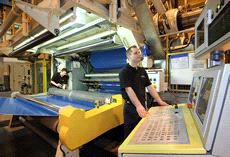Consumables
World First from ContiTech: Climate-Neutral Printing Blankets

Tuesday 16. March 2010 - Calendering process enables ContiTech to reduce CO2 emissions Acquisition of climate protection certificates offsets remaining CO2 emissions
As the first manufacturer anywhere in the world, ContiTech Elastomer Coatings has introduced a climate-neutral process for making its printing blankets. A production process of a new type eliminates up to 70 percent of the climate-damaging CO2 emissions released in the production of world standard printing blankets. The company offsets the residual CO2 emissions by supporting a reforestation project in Panama, for which it acquires climate protection certificates.
ContiTech carries the climate-neutral printing blankets in its CONTI-AIR HC line-up under the PURE PRINTING label and in its PHOENIX Xtra BLANKETS CARAT series under the CLIMATE-Xtra-BLANKETS label. “Our products are to be found wherever industry is looking for overall solutions of an eco-friendly quality,” notes Heinz-Gerhard Wente, chairman of the Executive Board of ContiTech AG. “Our driving concern is always to contribute to enhancing the quality of life and environmental protection. Were involved where the futures in the making – which means especially in the printing industry, too, with climate-neutral printing blankets.”
“By assuming a climate-neutral stance, ContiTech Elastomer Coatings has bolstered its leadership position in the printing blanket domain in terms of innovative environment and climate protection solutions,” adds Heiko Eymer, head of the Elastomer Coatings business unit. “We are proud to be the worlds first manufacturer marketing climate-neutral printing blankets and thus able, in this major way, to contribute to environmentally sound printing. And this is achieved at no extra cost to our customers.”
Enhanced climate protection thanks to calendering technology
The calendering process used in making CONTI-AIR HC line and PHOENIX Xtra BLANKETS CARAT series printing blankets is chiefly responsible for the small carbon footprint. A steel roller forms the rubber into a slab of the requisite thickness. This is a much more energy-efficient approach than the conventional coating process. What is more, solvent additives can be dispensed with, so VOC (volatile organic compound) emissions are greatly reduced.
The calendering processs favorable carbon footprint was determined last summer. ContiTech Elastomer Coatings was the worlds first manufacturer to have a life cycle assessment of its printing blankets drawn up and then certified, in this case by Ostwestfalen-Lippe University of Applied Sciences under the direction of Dr. Manfred Sietz, professor, und Martin Komander, graduate engineer. Compared to the conventional manufacturing process for world standard printing blankets, 70 percent fewer CO2 emissions were found to be released in producing printing blankets in the CONTI-AIR HC line-up and 35 percent fewer for the PHOENIX Xtra BLANKETS CARAT series. In the upcoming months the production sequence for the CARAT series will be further optimized, resulting in an additional reduction in CO2 emissions.
“As good as these values already are, we are going a step farther, because we want to offer our customers climate-neutral printing blankets,” explains Perkovi?, head of the printing blanket segment at ContiTech Elastomer Coatings. “That is why we opted to acquire climate protection certificates as a means of neutralizing the remaining CO2 emissions.”
Keeping things eco- and climate-friendly is one of the main challenges facing the printing industry. Solutions are in the works in all areas of production, materials and processing to render printed products more environmentally compatible and climate-friendly. As Perkovi? emphasizes: “We combine the calendering process with the acquisition of climate protection certificates because we want to help our customers achieve this goal. This puts us well ahead of all other printing blanket manufacturers.”
By combining the calendering process with the acquisition of climate certificates for a reforestation project, ContiTech Elastomer Coatings is able to climate-neutralize its printing blanket production.
Photo: ContiTech
Image Download
(JPG, RGB, 300dpi, app. 13x18cm, 420kB)
Reforestation project in Panama
To neutralize the remaining CO2 emissions, ContiTech acquired climate certificates from natureOffice (www.natureoffice.com), a climate protection agency. In so doing, ContiTech supports a reforestation project in Panama that benefits not only nature but also those living in an economically underdeveloped region. Planting trees creates a tropical forest that pulls carbon dioxide out of the atmosphere and releases oxygen. At the same time it protects the groundwater, prevents soil erosion and offers a habitat for rare fauna and flora. Long-term jobs with social benefits are, moreover, also created for the people in the area and their lives improved, not least of all by making microloans available to them.
ContiTech stands for sustainable solutions
Products from ContiTech AG, the world’s largest rubber and plastics technology specialist, make a substantial contribution to dealing with current challenges. Within the scope of its involvement with the printing industry, the company is therefore an active member of the European Waterless Printing Association (EWPA). The association has set itself the task of “promoting research and development in the area of waterless offset printing, with the aim of maintaining top printing quality at no cost to the environment”. The CONTI-AIR Steel CE 50/51 metal printing blanket, for example, is used for waterless offset printing. Whats more, the PHOENIX Xtra BLANKETS printing blanket production plant in Waltershausen has been certified in accordance with the DIN ISO 14001 environmental certificate and cited for additional discretionary investments in energy-saving projects and environmental technology by the State of Thuringia. The focus here is on a commitment to heat and energy recovery.
